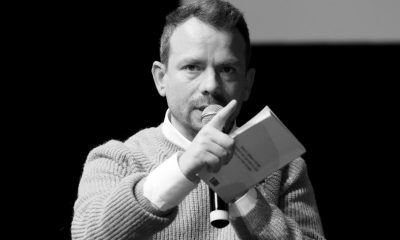EU
#VonDerLeyen, Fearne và một nam tước phu nhân người Anh


Greetings, and here’s EAPM’s latest update ahead of the weekend, writes European Alliance for Personalised Medicine (EAPM) Executive Director Denis Horgan.
It’s mid-July already and this week has seen the Greens flex their improved muscles in the European Parliament by saying that they will not support the candidacy of would-be European Commission President Ursula von der Leyen.
The German hopeful to replace Jean-Claude Juncker was grilled by the Greens, plus the liberals of Renew Europe and the S&D group, with some MEPs calling her responses to their questions ‘vague’.
Fearne firm on medicine discussions
Malta’s Health Minister Chris Fearne has also been in the news this week. Chris has worked well-and-often with EAPM and is a key player in Europe’s largest joint drug pricing alliance - the Valletta Group.
Fearneis currently hosting a meeting with the nine other Valletta countries in the Maltese capital to try to boost the group’s momentum. The other members are Croatia, Cyprus, Greece, Ireland, Italy, Portugal, Romania, Slovenia and Spain.
He recently gave an interview with Kinh tế họcin which he said that he wants the co-members to agree to drop the confidentiality clauses that member states sign in deals with drugs companies, saying: “I think that if … we can go to the industry as a group and say that it’s no longer acceptable to have this secrecy on any negotiating procedure, then the industry will have to take note.”
The Maltese minister said he believes that the Valletta alliance could offer to incentivize talks with manufacturers on new antibiotics- needed in the fight against antimicrobial resistance (AMR).
Talking about the two years of the Valletta Group, the minister said: “I think that these two years have been important that a lot of trust has been built between the Valletta declaration members, and I think we are now at the point where we can cash in on this trust…Now we can go into doing something concrete.”
He said that a challenge is that the group has “more-or-less been negotiating with the pharmaceutical industry on a voluntary basis…We’ve been negotiating on a number of molecules with the expectation that the price will go down. But of course the industry doesn’t have anything pushing them, so as soon as we seem to be getting somewhere, they pull out because it isn’t in their interest for the price to come down.”
He said: “A few weeks ago, the World Health Assembly voted on a resolution piloted by Italy, supported by Malta and others, calling for transparency of net pricing. And this will be on our agenda. Italy will be presenting this and I think this is an important point of discussion.
“Whenever there are contracts signed, one of the clauses is that there is a non-disclosure agreement on the price. I believe we have to discuss whether this can go on, or if we should stop it.”
He added: “For agreements that are already in place, there are the legal constraints and obviously we’re not advocating breaking any laws or any contracts.”
On AMR, Fearne said: “AMR is one of the biggest health risks that we are facing and governments need to intervene. Given that we have to collaborate with industry when it comes to research and the sharing of risk, then it will only make sense that those of us who share the risks will share the benefit when eventually new drugs or new antibiotics are developed.”
On the fact that industry has said that the problem is the market for antibiotics, not research, Fearne said he backed the focus on research because finding new incentives for antibiotics research“is actually in our interest as Member States and as patients,and [also] in the industry’s interest. So this is a win-win situation which allows us to go forward”.
More on meds
Germany’s health technology assessment body IQWiG and colleagues have written in the BMJ to argue for an overhaul of the international drug development processes and policies.
IQWiG-head Beate Wieselerand others argue on the basis that a majority of new medicines entering the German health-care system have not been shown to add any benefit.
IQWiG assessed 216 drugs entering country post-European Medicines Agency from 2011-2017, with justa quarter of them showinga considerable or major added benefit.
Available evidence did not prove an added benefit over standard carein some 60% of cases.
The authors said: “The situation is particularly egregious in some specialties. For example, in psychiatry/neurology and diabetes, added benefit was shown in just 6%and 17%of assessments, respectively.”
The authors recommend that manufacturers be required to submit comparative data when they submit a request for medicine approval.
The said: “Payers could then set reimbursement and pricing at levels that reward relevant outcomes for patients.Combined action at EU and national levels is required to revise the legal and regulatory framework, introduce new drug development models, and focus on the needs of patients.”
Shortages…again
It’s not just a post-Brexit Britain that faces a probable shortage in medicines supplies, it’s already the case that we have an all-time high of shortages in Europe, despite warnings for many years from pharmacists and campaign groups that the problem has been getting worse.
Charlotte Roffiaen, councillor for European affairs at patient organization France Assos Santé, said that “it used to be smaller countries with less attractive markets like Romania, Bulgaria, Eastern European countries. Now it’s all countries - even the wealthiest ones.”
Brussels has been under pressure to find an EU-wide solution, so the issue will be waiting on the doorstep as the new commission moves in to the Berlaymont.
Meanwhile, Estonia’shealth and social affairs ministry wantsto change the country’s medicines law to increase availability of medicines while also avoiding medicines affectingthe environment.
The changes, scheduled for July 2020, include helpingthe return of expired medicines to pharmacies; the possibility of exceptionally introducing non-authorized medicines for life-saving purposes at clinical trial stage; and allowing rural pharmacies to provide video advice when there is no pharmacy nearby.
Gỗ màu đen
Speaking at the British Paediatric Surveillance Unit rare disease summer tea party, Baroness Blackwood told the audience about her experiences of illness as a child with a rare disease.
She said: “For a very long time nobody knew what was wrong with me. I was undiagnosed and went through all the usual experiences of the diagnostic odyssey -getting very sick from childhood and being referred to many doctors who did their best but just couldn’t find out what was wrong with me.”
“This went on for 30 years,” she said, adding that finally a neurologist realised what was wrong, and referred herto a specialist who diagnosed her in just 20 minutes.
The Baroness explained that: “It was such a relief, but as I acquired more and more specialists and we began to try to get the right medical regime for me, I got much, much sicker and found trying to co-ordinate all the tests and appointments and new medications - while still working -impossible.
“Then the NHS stepped in and saved me and,gradually, the pieces fell into place and I have clawed my way back to stable health.”
Rare diseases and genetics
The baroness then moved onto genomics, explaining how over the past years “we’ve learned more and more about how our individual genetic make-up can lead us to develop a rare disease. And the UK’s 100,000 Genomes Project has helped with that.
“The headline is of course that in December 2018, the 100,000 Genomes Project completed its sequencing phase -a fantastic achievement by NHS England, Genomics England and other partners.”
The baroness explained that NHS England launched the Genomics Medicines Service (GMS), making the UKthe first in the world to integrate genomic technologies, including whole genome sequencing, into routine clinical care.
She said that seriously ill children who are likely to have a rare genetic disorder will be offered whole genome sequencing under the GMS.
The UK strategy
Meanwhile, Britain is developing a UK Genomics Healthcare Strategy, which will provide a clear, national vision setting out how the genomics community can work together to make the UK the global leader in genomic health care -for the benefit of patients.
She spoke aboutthe ‘NHS insert’, which gives NHS England a way to hold providers to account and improve services for rare diseases.
The criteria to be reported on are care co-ordination, an alert card, and transition. These mean that the provider must ensure that there is a person responsible for co-ordinating the care of any patient with a rare disease. Secondly, the provider must give every patient with a rare disease an ‘alert card’. This will include information about their condition, treatment regime and contact details for the individual expert involved in their care. Finally, the provider must ensure that every child has an active transition to an appropriate adult service.
The baroness added: “There is still much to be done to improve the experience of patients with rare conditions. That’s why I want to lead a national conversation on rare diseases, and how we care better for people.”
Alongside this, EAPM is of course pursuing its GOAL! and MEGA+ initiatives, which are heavily reliant on genomics and the sharing of genomic, and other health-care-related, data.
Cuối tuần vui vẻ nhé
Chia sẻ bài viết này:
-

 NATO4 ngày trước
NATO4 ngày trướcNghị sĩ châu Âu viết thư cho Tổng thống Biden
-

 Kazakhstan4 ngày trước
Kazakhstan4 ngày trướcChuyến thăm của Ngài Cameron chứng tỏ tầm quan trọng của Trung Á
-

 Thuốc lá4 ngày trước
Thuốc lá4 ngày trướcTobaccogate tiếp tục: Vụ án hấp dẫn của Dentsu Tracking
-

 Thuốc lá2 ngày trước
Thuốc lá2 ngày trướcViệc chuyển từ thuốc lá sang: cuộc chiến không hút thuốc đang giành chiến thắng như thế nào





















